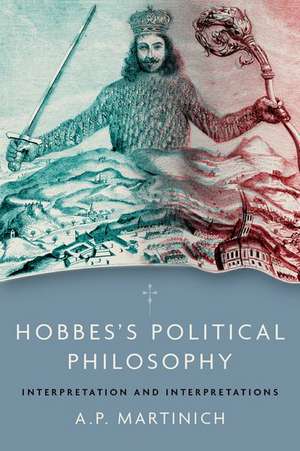Hobbes's Political Philosophy: Interpretation and Interpretations
Autor A.P. Martinichen Limba Engleză Hardback – 25 oct 2021
Preț: 517.90 lei
Preț vechi: 638.89 lei
-19% Nou
Puncte Express: 777
Preț estimativ în valută:
99.10€ • 103.73$ • 82.48£
99.10€ • 103.73$ • 82.48£
Carte disponibilă
Livrare economică 28 februarie-06 martie
Preluare comenzi: 021 569.72.76
Specificații
ISBN-13: 9780197531716
ISBN-10: 0197531717
Pagini: 304
Dimensiuni: 245 x 166 x 26 mm
Greutate: 0.59 kg
Editura: Oxford University Press
Colecția OUP USA
Locul publicării:New York, United States
ISBN-10: 0197531717
Pagini: 304
Dimensiuni: 245 x 166 x 26 mm
Greutate: 0.59 kg
Editura: Oxford University Press
Colecția OUP USA
Locul publicării:New York, United States
Recenzii
Ruth Boeker's book presents a very solid and very original discussion of Locke's theses, as well as a reassessment of the debate they have generated...The analytical orientation of the work, hardly surprising for such a subject, allows a clarification of the theses and the debates, according to a rigorous perspective, without being neither too dry nor too arduous.
Without developing a new interpretation of the philosophy of Hobbes, the work offers an interesting synthesis of the research of an eminent specialist, through a thoughtful or reflective practice.
Martinich succeeds in decisively shifting the burden of argument to advocates of deflationary or subversive interpretations of Hobbes'sengagement with religion. General readers looking to situate Hobbes's political philosophy historically should find Martinich's Hobbes more plausible than atheistic interpreters', but also more interesting because Martinich's Hobbes can speak to religious motivations today. For Hobbes specialists, cover to cover study of Martinich's book is essential.
It is impossible in a short review to do justice to this varied and interesting collection
Without developing a new interpretation of the philosophy of Hobbes, the work offers an interesting synthesis of the research of an eminent specialist, through a thoughtful or reflective practice.
Martinich succeeds in decisively shifting the burden of argument to advocates of deflationary or subversive interpretations of Hobbes'sengagement with religion. General readers looking to situate Hobbes's political philosophy historically should find Martinich's Hobbes more plausible than atheistic interpreters', but also more interesting because Martinich's Hobbes can speak to religious motivations today. For Hobbes specialists, cover to cover study of Martinich's book is essential.
It is impossible in a short review to do justice to this varied and interesting collection
Notă biografică
A. P. Martinich received his Ph. D. from the University of California at San Diego in 1973. He specialized in the philosophy of language and the history of political philosophy, especially 17th century English philosophy. He was Vaughan Centennial Professor in Philosophy from 1999 until his retirement in 2020. He was also Professor of History and of Government. He was a member of the Board of Directors of the Journal of the History of Philosophy from 1983 until 2018 and vice-president of the Board from 1996 until 2018. For many years, he has been a member of the advisory board of several journals or professional organizations such as, Comparative Philosophy (2009- ), Hobbes Studies (2013- ) and the European Hobbes Society (2015- ). He is currently emeritus professor of philosophy. His books and articles have been translated into Chinese, Korean, Persian, Portuguese, Slovak, and Turkish. He has lectured internationally for decades, especially in the People's Republic of China.
